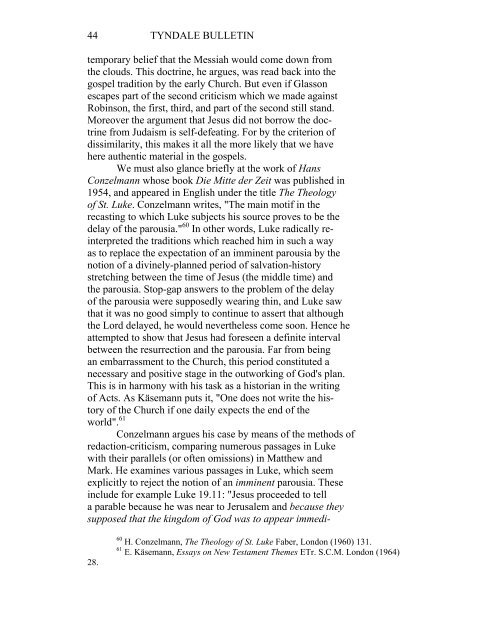the parousia in modern theology: some questions ... - Tyndale House
the parousia in modern theology: some questions ... - Tyndale House
the parousia in modern theology: some questions ... - Tyndale House
You also want an ePaper? Increase the reach of your titles
YUMPU automatically turns print PDFs into web optimized ePapers that Google loves.
44 TYNDALE BULLETIN<br />
temporary belief that <strong>the</strong> Messiah would come down from<br />
<strong>the</strong> clouds. This doctr<strong>in</strong>e, he argues, was read back <strong>in</strong>to <strong>the</strong><br />
gospel tradition by <strong>the</strong> early Church. But even if Glasson<br />
escapes part of <strong>the</strong> second criticism which we made aga<strong>in</strong>st<br />
Rob<strong>in</strong>son, <strong>the</strong> first, third, and part of <strong>the</strong> second still stand.<br />
Moreover <strong>the</strong> argument that Jesus did not borrow <strong>the</strong> doc-<br />
tr<strong>in</strong>e from Judaism is self-defeat<strong>in</strong>g. For by <strong>the</strong> criterion of<br />
dissimilarity, this makes it all <strong>the</strong> more likely that we have<br />
here au<strong>the</strong>ntic material <strong>in</strong> <strong>the</strong> gospels.<br />
We must also glance briefly at <strong>the</strong> work of Hans<br />
Conzelmann whose book Die Mitte der Zeit was published <strong>in</strong><br />
1954, and appeared <strong>in</strong> English under <strong>the</strong> title The Theology<br />
of St. Luke. Conzelmann writes, "The ma<strong>in</strong> motif <strong>in</strong> <strong>the</strong><br />
recast<strong>in</strong>g to which Luke subjects his source proves to be <strong>the</strong><br />
delay of <strong>the</strong> <strong>parousia</strong>." 60 In o<strong>the</strong>r words, Luke radically re-<br />
<strong>in</strong>terpreted <strong>the</strong> traditions which reached him <strong>in</strong> such a way<br />
as to replace <strong>the</strong> expectation of an imm<strong>in</strong>ent <strong>parousia</strong> by <strong>the</strong><br />
notion of a div<strong>in</strong>ely-planned period of salvation-history<br />
stretch<strong>in</strong>g between <strong>the</strong> time of Jesus (<strong>the</strong> middle time) and<br />
<strong>the</strong> <strong>parousia</strong>. Stop-gap answers to <strong>the</strong> problem of <strong>the</strong> delay<br />
of <strong>the</strong> <strong>parousia</strong> were supposedly wear<strong>in</strong>g th<strong>in</strong>, and Luke saw<br />
that it was no good simply to cont<strong>in</strong>ue to assert that although<br />
<strong>the</strong> Lord delayed, he would never<strong>the</strong>less come soon. Hence he<br />
attempted to show that Jesus had foreseen a def<strong>in</strong>ite <strong>in</strong>terval<br />
between <strong>the</strong> resurrection and <strong>the</strong> <strong>parousia</strong>. Far from be<strong>in</strong>g<br />
an embarrassment to <strong>the</strong> Church, this period constituted a<br />
necessary and positive stage <strong>in</strong> <strong>the</strong> outwork<strong>in</strong>g of God's plan.<br />
This is <strong>in</strong> harmony with his task as a historian <strong>in</strong> <strong>the</strong> writ<strong>in</strong>g<br />
of Acts. As Käsemann puts it, "One does not write <strong>the</strong> his-<br />
tory of <strong>the</strong> Church if one daily expects <strong>the</strong> end of <strong>the</strong><br />
world". 61<br />
Conzelmann argues his case by means of <strong>the</strong> methods of<br />
redaction-criticism, compar<strong>in</strong>g numerous passages <strong>in</strong> Luke<br />
with <strong>the</strong>ir parallels (or often omissions) <strong>in</strong> Mat<strong>the</strong>w and<br />
Mark. He exam<strong>in</strong>es various passages <strong>in</strong> Luke, which seem<br />
explicitly to reject <strong>the</strong> notion of an imm<strong>in</strong>ent <strong>parousia</strong>. These<br />
<strong>in</strong>clude for example Luke 19.11: "Jesus proceeded to tell<br />
a parable because he was near to Jerusalem and because <strong>the</strong>y<br />
supposed that <strong>the</strong> k<strong>in</strong>gdom of God was to appear immedi-<br />
28.<br />
60 H. Conzelmann, The Theology of St. Luke Faber, London (1960) 131.<br />
61 E. Käsemann, Essays on New Testament Themes ETr. S.C.M. London (1964)

















